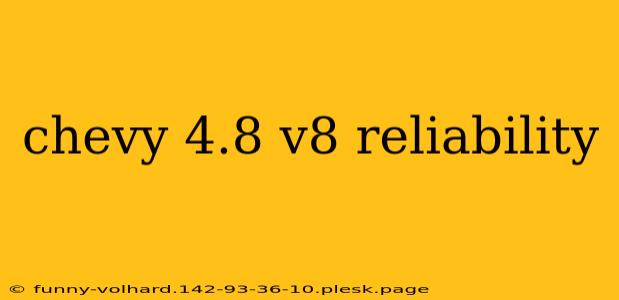The Chevrolet 4.8L V8 engine, a stalwart of GM's truck and SUV lineup for many years, has earned a reputation for its robust build and impressive towing capacity. But how reliable is it really? This in-depth analysis will explore the 4.8L's strengths, weaknesses, common problems, and overall longevity, helping you determine if this engine is the right choice for your needs.
The 4.8L's Strengths: A Foundation of Durability
The 4.8L Vortec V8, found in various GM vehicles from the late 90s to the mid-2000s, boasts a design emphasizing durability and simplicity. Key features contributing to its reliability include:
- Pushrod Design: The pushrod valve train is inherently simpler and more robust than overhead cam (OHC) designs, leading to fewer potential points of failure. This translates to less maintenance and potentially longer engine life.
- Cast-Iron Block: The cast-iron engine block is known for its strength and resistance to wear and tear, providing a solid foundation for the engine's longevity.
- Proven Design: The 4.8L is a derivative of the larger and even more legendary 5.7L and 6.0L Vortec engines. This means it benefits from years of engineering refinement and proven design principles.
Common Issues and Potential Weaknesses: Understanding the Limitations
While generally reliable, the 4.8L isn't without its potential issues. Understanding these potential problems can help you proactively address them and maximize the engine's lifespan.
1. Intake Manifold Issues:
- Cracks: Older 4.8L engines, particularly those exposed to extreme temperatures, are susceptible to cracking in the plastic intake manifold. This can lead to vacuum leaks and reduced performance. Regular inspection is crucial.
- Gasket Leaks: The intake manifold gasket can also fail, causing similar issues to cracks in the manifold itself.
2. Oil Consumption:
- Valve Stem Seals: As the engine ages, valve stem seals can deteriorate, leading to increased oil consumption. This is a common issue and often requires attention.
3. Cooling System Problems:
- Water Pump Failure: Like any engine, the water pump can fail, potentially leading to overheating. Regular maintenance and prompt attention to any cooling system leaks are key.
4. Rear Main Seal Leaks:
- Seal Deterioration: Over time, the rear main seal can leak, leading to oil loss. This often requires replacement.
Maintaining Your 4.8L for Optimal Longevity: Proactive Measures
Regular maintenance is paramount to maximizing the lifespan of your 4.8L engine. Here's what to focus on:
- Regular Oil Changes: Using the correct weight and type of oil, as specified in your owner's manual, is crucial. Sticking to the recommended oil change intervals will help keep the engine lubricated and running smoothly.
- Coolant Flushes: Regular coolant flushes prevent buildup and corrosion within the cooling system.
- Inspection of Hoses and Belts: Regular visual inspection of hoses and belts can help prevent unexpected failures.
- Addressing Issues Promptly: Addressing any unusual noises, leaks, or performance issues promptly will prevent minor problems from escalating into major repairs.
Conclusion: A Reliable Workhorse with Considerations
The Chevrolet 4.8L V8 engine has proven itself a reliable workhorse over the years. Its robust design and relatively simple construction contribute to its longevity. However, like any engine, it’s not immune to potential problems. By understanding these potential issues and performing regular maintenance, you can significantly extend the life and performance of your 4.8L engine. Regular inspection and prompt attention to any issues are key to ensuring years of trouble-free operation.

